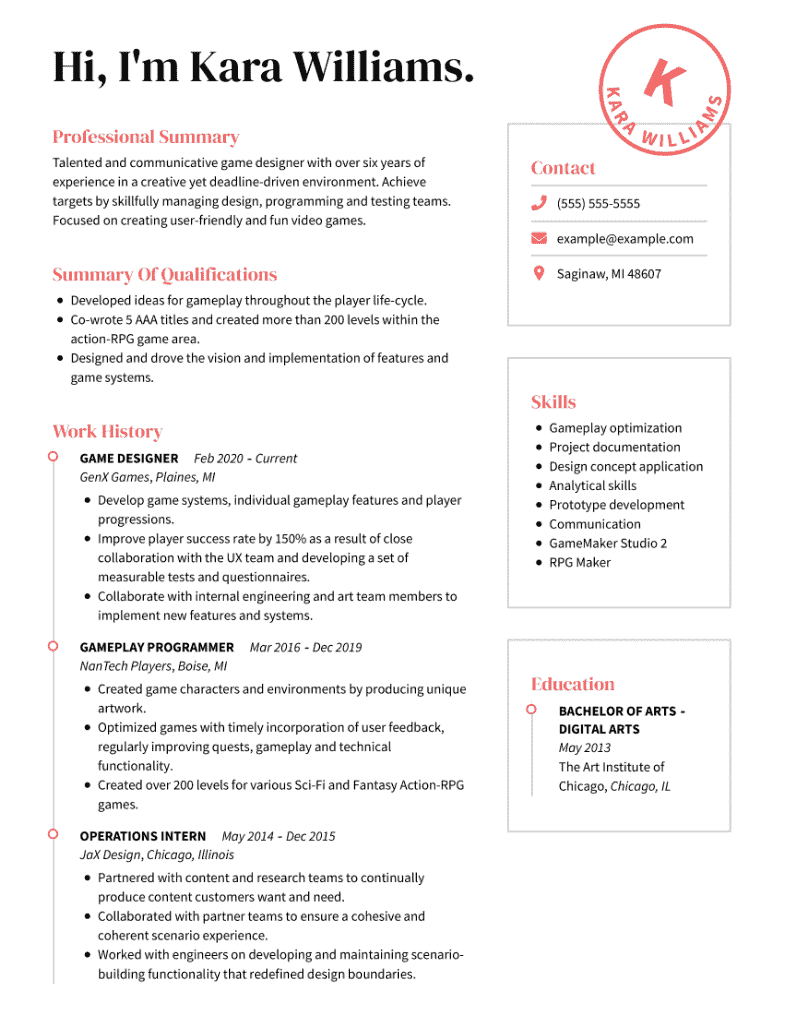Fantastic game design CV examples for this year
A game designer needs to match creativity with technical skills and industry know-how. See how to showcase your skills in this game design CV sample.
A game designer needs to match creativity with technical skills and industry know-how. See how to showcase your skills in this game design CV sample.





OUR USERS HAVE BEEN HIRED BY

A game designer needs to be creative yet technical, taking care of all aspects of game development, including story, character, level design, settings and the rules of gameplay. Therefore, game designer skills include programming, graphic design, scripting, game mechanics and much more. The best CV for a game designer job will reflect this broad range of abilities and show that you have the relevant skills to perform the role’s duties.
Any recruiter for the gaming industry wants to see evidence of technical expertise shown through either your previous work experiences or the skills you possess. You must establish your credibility to show the hiring manager that you can perform the duties outlined in the job description.
However, it’s also essential to highlight your interpersonal skills. Teamwork is critical in game design, so you need to show you can collaborate with team members effectively.
Your CV comprises different sections, including the header, the professional summary or career objective, and sections outlining your skills, work experience and education. You can arrange your CV according to one of three different CV formats: the chronological format, which highlights work history, the functional format, which emphasises skills, and the combination format, which stresses both. Choose a format that puts your strengths first, whether it’s skills or extensive work experience..
You must make it easy for the hiring manager to contact you. You do this by putting your full name and contact information at the top of the page in your header. For a game designer CV, you should put any portfolio links and your LinkedIn profile into the header too. This allows the recruiter to check out your work if they wish.
The professional summary or career objective lays out how your relevant experience impacts what you can do for the company. It’s a two to three-sentence paragraph that introduces your career background and lists some of your specialties. Check out the links above to explore the differences between them.
You’ll need to reference both soft and hard skills to land your dream job in game design. Check the job posting for clues as to what the hiring manager is looking for, and use this to frame the skills you advertise in your skills section. Employers are looking for the following skills:
In reverse chronological order (most recent job first), list your previous relevant professional experiences in this section. Experience may be challenging to evaluate. Many game designers spent years as a programmer or in quality assurance testing before entering game design. Some may have worked on mobile games or may have contributed in some way to AAA games. Others may be entry-level. Depending on where you are with your journey in game design, you need to choose roles that are relevant to the job you are applying for. There can be various job titles within game design that incorporate different duties, so be sure to check the job description fully.
A professional CV helps draw the line between your previous roles and the job advertised. Make sure to outline duties and responsibilities with action words (e.g., “Managed,” “Oversaw”) to give agency to your achievements.
Your education section should highlight any certifications you have that show your expertise in game design. Many candidates now enter the field with a bachelor’s degree in game design, computer science, or a related degree. While not always a necessary qualification, you should include it in your CV if you have it. Technical certificates in specific programming languages or software applications should also be featured here as evidence of your skills.
Here are a few bullet points outlining some basic rules for your professional CV:
You should always write a cover letter. Writing a cover letter shows you are genuinely interested in the role. It also allows you to expand on some aspects of your CV and deliver a personal touch. Check out our tips for an effective cover letter.
You don’t need a formal qualification to become a game designer. However, as with many technical roles involving some aspect of programming, computer science or digital design, there are increasing numbers of entry-level candidates coming into roles with a bachelor’s degree. Look into options for online professional certifications for game design-related skills to boost your chances of landing a role.
Check out our helpful guide to writing a targeted CV. One tip is to address the keywords used in the job description (e.g., particular skills or experiences the employer favours). This will vary from job to job as game design roles will often specify what software knowledge is needed. Addressing these keywords in your CV will help it pass reviews from applicant tracking systems (ATS) that hiring managers use to screen CVs.
We personalize your experience.
We use cookies in our website to ensure we give you the best experience, get to know our users and deliver better marketing. For this purpose, we may share the information collected with third parties. By clicking “Allow cookies” you give us your consent to use all cookies. If you prefer to manage your cookies click on the “Manage cookies” link below.